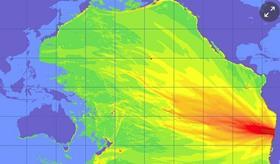
Chile's fruit industry is believed to have suffered minimal damage after a powerful earthquake rocked the country last night, killing at least eight people and forcing the evacuation of a million more. The earthquake also triggered tsunami warnings across the Pacific Coast of Central and South America and as far away as New Zealand.
Asoex said that so far there had not been any reports of damage to either packing sheds, coldstorage facilities or transportation links. The association issued a statement saying:
'The Chilean fresh fruit industry is assessing the impact of yesterday’s earthquake on production areas in northern and central regions of the country. At this point, it remains too early to deliver a full long-term analysis, but indications are that the industry has emerged with almost no damage.'
It added that there would be minimal disruption to shipments of citrus and avocados – currently in full season – from the ports of Valparaíso and San Antonio.
However, it is still unknown whether the state of infrastructure of the northern port of Coquimbo has been affected by the earthquake and subsequent tsunami. Asoex said a more detailed evaluation of the situation was required, as the first shipments of fruit for the 2015/16 season were due to get underway in December.
Chairman Ronald Bown said: “There does not seem to be any impact on the fruit industry and the coming cherry and blueberry season should begin without any major interruption. Chile is well prepared for these types of seismic events and growers and exporters will continue to make every effort to meet previously established shipping goals. At the same time, as an industry, we would like to send our deepest condolences to the families of those compatriots who have lost their lives in this earthquake.'
The first tsunami is believed to have hit the coastal city of Tongoy in Chile at 8.20pm local time, around half an hour after the earthquake. Subsequently, the National Emergency Office of the Ministry of Interior and Public Security (ONEMI) confirmed that a 4.5m wave hit Coquimbo, the region closest to the earthquake’s epicentre. More than a dozen smaller waves have arrived in communities from Valparaiso to Juan Fernandez.
Chile has now lifted its tsunami advisory, but reports are coming in that the first tsunami waves have hit Mexico and French Polynesia - the latter being the only country other than Chile expected to see waves above the usual tide level, according to the Pacific Tsunami Warning Center.
Meanwhile, the Chilean Navy’s SHOA oceanographic service has ordered vessels to sail at least 10 nautical miles from the coast, while ships have reportedly been evacuated from Valparaíso and ordered to remain five miles from the coast.
The earthquake, which measured 8.3 on the Richter scale, struck at 7.54pm, with its epicentre recorded 34 miles west of Illapel, a town of 30,000 people, resulting in widespread power outages and causing some buildings to collapse. Such was its strength that it was felt in Buenos Aires, almost 1,000 miles away.
Speaking on national television, president Michelle Bachelet said Tongoy and Coquimbo had suffered widespread flooding and damage. She has declared a catastrophe zone and drafted in the military to help the population and prevent looting.
“Once again we must confront a powerful blow from nature,” Bachelet said.
People have been advised not to return to their homes until they have been given the all clear by the authorities.
Coquimbo has been in the grip of a decade-long drought that has decimated local fruit production. The region has 53,000ha of fruit production, accounting for one-sixth of the country’s total planted area. The number of people employed in the industry has fallen from 59,000 in 2007 to 44,000 in 2014, according to a report from the Northern Agricultural Society.



